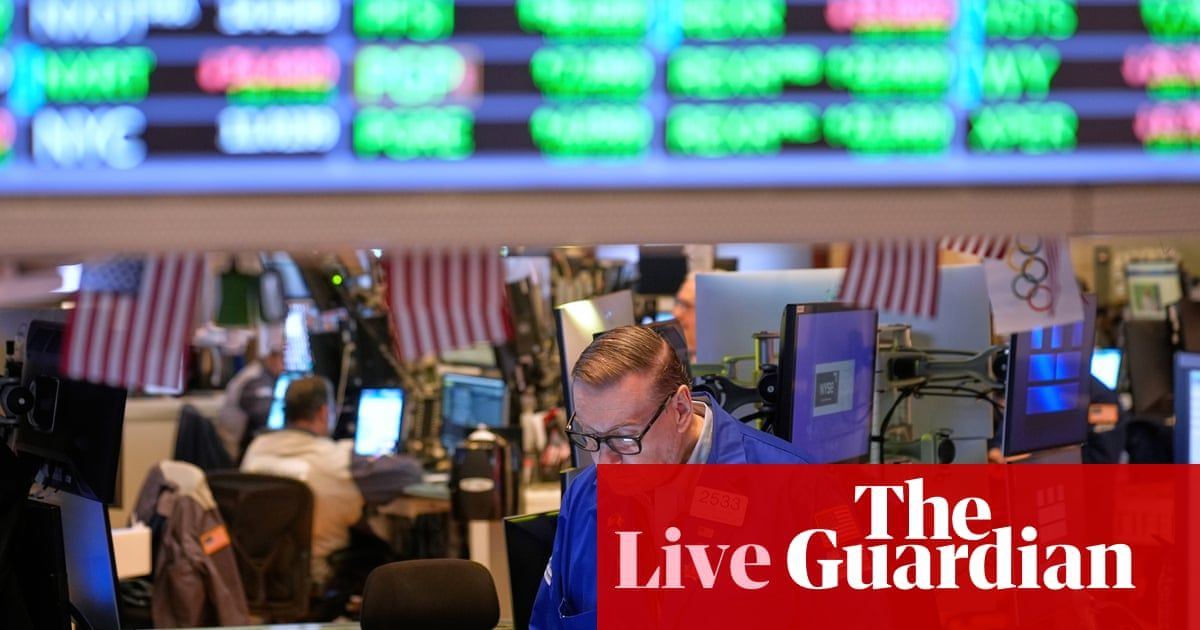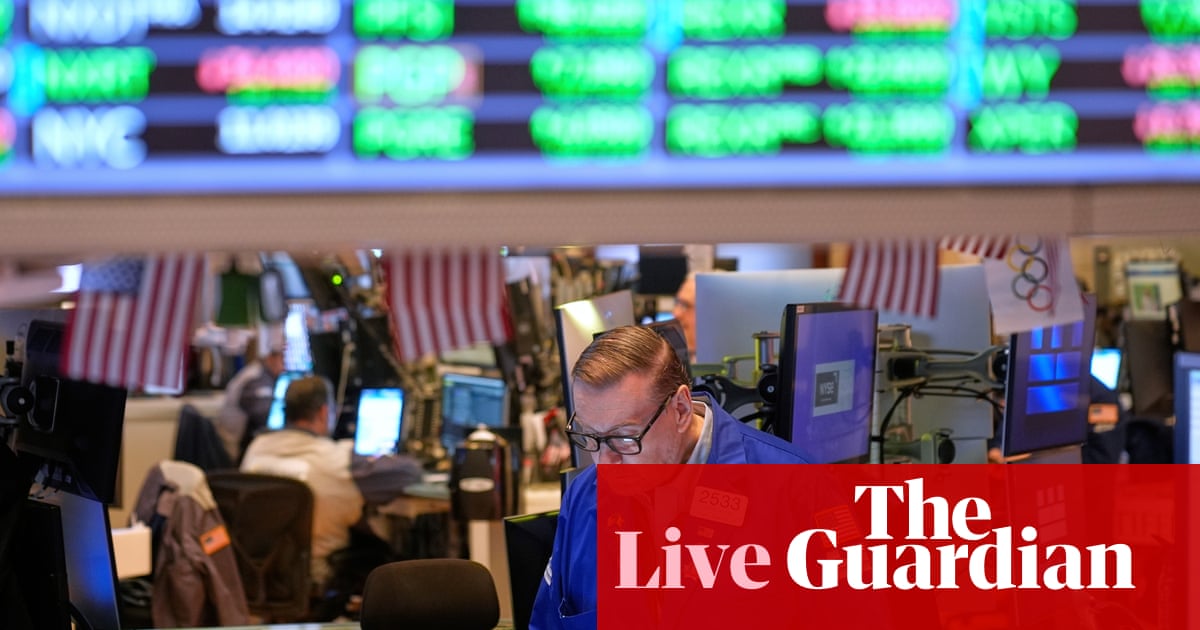
Wall Street slumps as hopes wane for tariff delays – business live

The US stock market is careening through a second straight day of stunning swings with Wall Street’s main indexes flitting between red and green, as investors’ hopes ebbed for US delays or concessions on tariffs ahead of a midnight deadline.
The S&P 500 lost an early gain of 4.1%, which had it on track for its best day in years, and slumped 1.7% with about an hour left in trading.
The Dow Jones Industrial Average lost 403 points, or 1%, after giving up its earlier surge of 1,460 points, while the Nasdaq composite was 2.4% lower, as of 3.13pm Eastern time.
Stocks globally had rallied much more earlier in the day, with indexes up 6% in Tokyo, 2.5% in Paris and 1.6% in Shanghai.
But even after those jumps, analysts had been warning to expect more swings up and down for financial markets not just in the days ahead but also the hours.
The price of bitcoin fell to around $76,600 as it gave up an earlier gain, similar to stocks.
The US stock market is careening through a second straight day of stunning swings with Wall Street’s main indexes flitting between red and green, as investors’ hopes ebbed for US delays or concessions on tariffs ahead of a midnight deadline.
The S&P 500 lost an early gain of 4.1%, which had it on track for its best day in years, and slumped 1.7% with about an hour left in trading.
The Dow Jones Industrial Average lost 403 points, or 1%, after giving up its earlier surge of 1,460 points, while the Nasdaq composite was 2.4% lower, as of 3.13pm Eastern time.
Stocks globally had rallied much more earlier in the day, with indexes up 6% in Tokyo, 2.5% in Paris and 1.6% in Shanghai.
But even after those jumps, analysts had been warning to expect more swings up and down for financial markets not just in the days ahead but also the hours.
The UK health minister, Stephen Kinnock, said the global economic headwinds were “very turbulent” amid Donald Trump’s imposition of tariffs.
“It is very turbulent. Nobody benefits from a trade war,” he told Sky News on Tuesday.
We live in an incredibly deeply integrated global economy with very integrated supply chains and hugely interdependent commercial relationships, so nobody benefits from a trade war.
Keir Starmer and Rachel Reeves are actively considering nationalising British Steel in an escalation of plans first revealed in the Guardian last year.
The prime minister said all options were on the table to secure the future of the Scunthorpe plant, which is owned by the Chinese firm Jingye and employs about 3,500 people.
The possibility of nationalisation was first revealed in December but discussions have taken on fresh urgency with US tariffs and talks about a financial support package to move to less polluting technology having faltered.
The government has now been forced to consider more drastic options, ranging from nationalisation to buying materials to keep the blast furnaces going.
If the plant is stopped, it could be even less economical to reopen, with only about 48 hours to buy raw materials to keep it burning. The facility makes the steel for almost all UK rail tracks.
Whitehall sources said Starmer and Reeves were aligned in considering steel to be of “huge strategic importance” and that “all options are on the table, including nationalisation”. The chancellor spoke to union leaders involved in talks over the weekend and made clear her support for the steel industry.
Oil prices fell more than $1 a barrel on Tuesday, trading at four-year lows, as recession fears exacerbated by the trade conflict between the US and China offset a stock market rebound.
Brent futures were down $1.47, or 2.29%, at $62.74 a barrel at 1.13pm EDT (1713 GMT).
US West Texas Intermediate crude futures fell $1.26, or 2.08%, to $59.44.
The two benchmarks had slumped by 14% and 15%, respectively, on Monday after Donald Trump’s tariff announcement last week.
Thailand plans to send a high-ranking delegation to Washington to negotiate with their US counterparts over the new tariff policies.
The delegation will be led by the Thai deputy prime minister and finance minister, Pichai Chunhavajira.
Thailand is facing a 36% tariff under the new US rules. Bangkok’s plans reportedly include revising its import duties and amending non-trade barriers.
The UK should not “jump in with both feet” to retaliate against Donald Trump’s trade tariffs, Keir Starmer has said.
“My instinct is that we shouldn’t jump in with both feet to retaliate,” Starmer told members of parliamentary committee on Tuesday.
Obviously we have to keep our options on the table and do the preparatory work for retaliation if necessary. But I think that trying to negotiate an arrangement which mitigates the tariffs is better.
The tariffs are not a “temporary passing phase” but part of a “changing world order”, he added.
The US will impose a 104% tariff on China starting from midnight tonight, the White House’s press secretary Karoline Leavitt said.
“It will be going into effect at 12.01am tonight. So effectively tomorrow,” Leavitt told reporters.
Asked if Donald Trump will do a deal with the Chinese president, Xi Jinping, she said:
The Chinese want to make a deal. They just don’t know how to do it. [Trump] believes China has to make a deal with the United States.
The US president has threatened to impose an additional 50% tariff on imports from China unless Beijing rescinds its retaliatory tariffs of 34%.
The additional 50% tariff on China would be on top of the 34% reciprocal tariff Trump announced last week and the 20% already in place.
The White House’s press secretary, Karoline Leavitt, is holding a press briefing.
Nearly 70 countries have reached out to begin negotiations on tariffs, she told reporters.
“Countries are falling over themselves,” Leavitt said.
Why? It’s because these countries greatly respect President Trump in the sheer power of the American market.
She said Donald Trump met with his trade team earlier today and directed them to create “tailor-made” deals for every trade partner.
Porsche sales slumped in the first three months of the year as an increase in deliveries to the US was overshadowed by falls in Europe and China, while Donald Trump’s trade war has triggered uncertainty in the global car industry.
The German car manufacturer reported a 37% rise in North American deliveries in the period from January to March, hitting 20,698, which Porsche said was partly because of low figures last year when car deliveries were delayed due to import restrictions on Chinese components.
However, the growth in American orders was not enough to offset steep falls in China, Germany and the rest of Europe – where deliveries fell by 42%, 34% and 10% respectively. Overall, deliveries of Porsche cars fell by 8% in the first quarter of the year to 71,470.
Slowing orders come as the US president enforces a 25% levy on car imports to the US, as part of a bigger package of trade tariffs that has caused a brutal sell-off in global stock markets.
Italy’s prime minister Giorgia Meloni will travel to the US next week for talks on tariffs with Donald Trump, her office has said.
Meloni has called Trump’s decision on tariffs a mistake, but warned that EU countermeasures could escalate a trade war, and called for negotiations to mitigate the crisis.
Italy last year ran the third-largest trade surplus in the EU for goods with the US, after Germany and Ireland.
FTSE 100 closed 208.5 points up at 7,910.5, a 2.7% rise
France’s CAC closed 131.9 points up at 5,265.0 a 2.6% rise
Germany’s DAX rose 2.5% to 20,280.3, up 490.6 points
The pan-European Stoxx 600 index rose 2.7%
US trade representative Jamieson Greer has said Donald Trump is not expected to announce exemptions to his global tariffs “in the near term”.
Greer, speaking before the US Senate finance committee on Tuesday, said:
The president has been clear, again, that he’s not doing exemptions or exceptions in the near term.
He added that “Swiss cheese” in the process would undermine the goal of trade reciprocity.
Asked if there is a timeline for negotiations, Greer said:
We don’t have any particular timeline set on that because … the outcome is more important than setting something artificially for us.
“What I can say is I’m moving as quickly as possible, and a lot of these countries are moving very quickly,” he added.
Canada’s main stock index rose on Tuesday after three straight sessions of losses as investors watch for any signs of the US opening up for tariff negotiations.
Toronto Stock Exchange’s S&P/TSX composite index was up 2% at 23,325.64 points.
Reuters cites Graham Priest, investment advisor at BlueShore Financial, as saying:
The TSX often mirrors US indices, and with those showing cautious optimism today after tariff-driven sell-offs, any overnight developments — especially if China doubles down — could trigger volatility.
Donald Trump supporter and billionaire fund manager Bill Ackman says he is calling for a “30, 60, or 90- day pause before the tariffs are implemented tomorrow” in a post on X.
He said yesterday that the president is losing the confidence of business leaders and should pause his trade war – which could cause an economic collapse while damaging his supporters the most.
“The president has an opportunity to call a 90-day time out,” Ackman said on Sunday in a post on X, to resolve trade issues via negotiation.
But this afternoon he clarified his remarks:
Some have misinterpreted my thoughts on tariffs. I am totally supportive of President @realDonaldTrump using tariffs to eliminate tariffs and unfair trading practices of our trading partners, and to induce more investment and manufacturing in our country.
I am advocating for a 30, 60, or 90- day pause before the tariffs are implemented tomorrow to enable negotiations to be completed without a major global economic disruption that will harm the most vulnerable companies and citizens of our country.
If a country does not negotiate in good faith, then @realDonaldTrump can bring the hammer down, but doing so without giving time to make deals creates unnecessary harm. I welcome the counterpoint.
India is seeking to strike more trade deals with other countries at a time of “global uncertainty”, its finance minister, Nirmala Sitharam, said before talks with the UK chancellor, Rachel Reeves.
Sitharam, who serves as finance and corporate affairs minister in Narendra Modi’s government, said she was hopeful the UK and India would finalise a free trade deal “sooner rather than later”.
Speaking at the Indian high commission during a visit to London, Sitharam said global uncertainties were “multiplying by the day”, which was “driving many countries to clearly be active on [seeking] bilateral arrangements” that went beyond their old ideological and political ties.
“India is also looking at many bilateral arrangements. In the recent past, we’ve signed agreements with Australia, the UAE, with Oman, and we’re looking forward to concluding the bilateral trade agreement with the UK, negotiating also with the EU,” she said. “I think that’s the way the world is going.”
Oil prices ticked higher on Tuesday but remained near four-year lows.
Brent futures were up 66 cents, or 1.03%, at $64.87 a barrel at 10:13am EST.